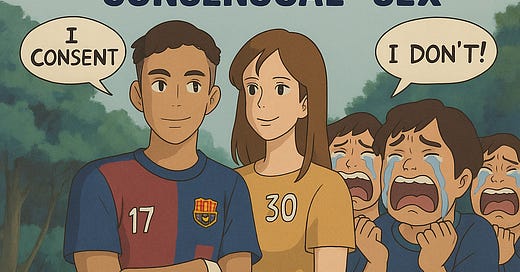The explosive Lamine Yamal was recently found to be doing a different kind of explosion in a different kind of pitch, and several area brothers got into a fit about it. Yes, Yamal consented. Yes, the woman consented. But did internet busybodies consent? That is the real question.
In an earlier article, I explored how strange our interpretations of consent have now become. In this one, I will explore an even more contentious and ridiculous framing of consent. Namely, the legal mystery (not really) called the age of consent. Simply put, it means the age at which the government believes you have all the necessary knowledge to consent.
After the Yamal sighting, thousands of people descended on the woman and called her a pedophile. Central to the argument is that Yamal is just 17, and he cannot consent to sex. As such, the woman here—who was closer to 30—was a predator who was just with him to emotionally manipulate him. The fulcrum that this argument rests on is the idea that Yamal’s intelligence and susceptibility to manipulation is somehow dictated by the date on his birth certificate. It is a common argument, but a really bad one.
Yamal is not an ordinary teenager. He earns millions of euros per year from one of the biggest sporting organizations in the world, is subjected to immense pressure and scrutiny at a high-level sport which requires genius skill, and is one of the most famous persons in the world. To get into that position, he has had to enter serious and binding, sophisticated legal contracts that are certainly more consequential to his life and future than a summer fling with a thirty-year-old.
We seem to be forgetting that the age of consent itself is necessarily arbitrary. It is a proxy for sexual maturity, which takes place as early as 12 in some people and as late as 17 in others. In any case, the reason we adopt 18 as an age of consent isn’t because the fairy of intelligence drops sexual wisdom in your head the very day you turn 18, but because everyone is expected to have been sexually mature by 18. Not emotionally mature. Not psychologically mature. Sexually mature. In recent years, some nations have even found this age to be excessive, and in some parts of Europe, like Spain, the age of consent is at 16.
But in the case where we know the individual, this proxy becomes unnecessary. What is the material difference between a 17-year-old Yamal and the 30-year-old Twitterati who sleeps on his mother’s couch? Why should that thirty-year-old be allowed more sexual freedom than Yamal by the state? What levels of freedom or responsibility or exposure does the random 30-year-old man, by virtue of his age, have that Yamal doesn’t? In fact, he is necessarily more powerful than almost all adults on the planet because of the level of wealth he has managed to acquire. He controls millions of euros in assets; but somehow, five minutes of pleasure with someone older is a step too far? It is a bad position.
In any case, the argument that Yamal is uniquely susceptible to exploitation by older women is voided by the fact that he has already entered into a more consequential contract with a more powerful (and demonic) entity: FC Barcelona. Anyone mentally sound enough to enter a contract with that entity is allowed a few adult freedoms, as a treat. Besides, adults are not immune to these scams. There are thousands of lonely fifty-year-old Chads and Stephanies who have now entered fake romantic relationships with 16-year-old schoolboys in the backwaters of Lagos. Making these relationships an exclusive preserve of adults because of exploitation is incoherent, since adults are also regularly scammed.
There is the argument that these contracts are fair because Yamal is advised by his parents and guardians. But that is just another transparent lie; are we supposed to believe his guardians do not follow his explicit wishes in these transactions? And even if they didn’t, would his relationship with an older person be by the books if his parents advised on it? Of course not.
There are some who agree, but insist that social convention should still take precedence and this age of consent must be enforced even in this case. But that position is dogmatic; man isn’t made for law, law is made for man. Or as Jesus said, the Sabbath is made for man. Man isn’t made for the Sabbath. The age of consent, to borrow from a friend, is inherently a low-information proxy. When other information is available, that tells us the level of responsibility and freedom an individual should reasonably be subject to, we should use it. If we trust a teenager with contracts worth millions, public image management, and global scrutiny and responsibility, perhaps we can stop pretending he’s a naïve infant when it comes to personal relationships.



Solid argument!
But, what is the alternative?